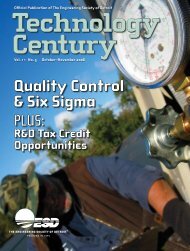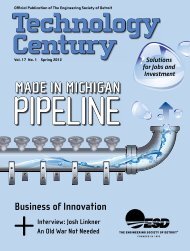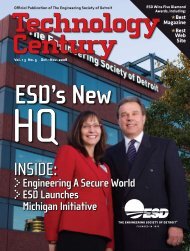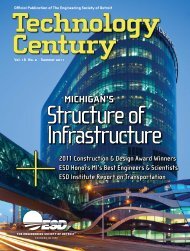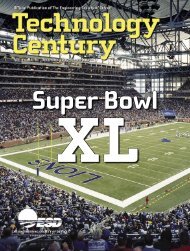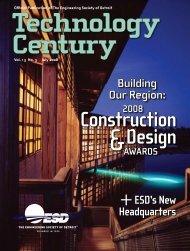INSIDE: - ESD
INSIDE: - ESD
INSIDE: - ESD
- No tags were found...
Create successful ePaper yourself
Turn your PDF publications into a flip-book with our unique Google optimized e-Paper software.
of project success. Focusing first on the needs of theproject ensures expectations and requirements will bemet or exceeded.QBS AT WORKThe QBS process is straightforward, easy to implement,objective, fair, well documented, and designed to be opento public scrutiny (an essential element for publicallyfunded projects).The process consists of these steps:••The owner prepares and issues a project description••The owner requests statements of qualification••The owner evaluates qualifications received, based onspecific, predetermined criteria••The owner identifies the short list of preferred firmsand conducts interviews••The owner ranks the firms based on predeterminedinterview criteria••The owner negotiates scope of work and design feewith the highest ranked firmIf an acceptable agreement cannot be reached with thetop ranked firm, negotiations would then begin with thenext most qualified firm.WHY USE QBS?There are a number of reasons why QBS shouldbe considered for all building projects. Federallaw requires QBS through the Brooks Act of1972. Indication is that the requirement will beexpanded to include a broader range of projects,given the success realized to date. In addition, 44states, including Michigan and hundreds of localmunicipalities, have endorsed QBS as their preferredprocurement procedure.QBS is endorsed by the American Public WorksAssociation (APWA), which represents owners whoprocure engineering services. APWA’s publicationsstate, the “public’s best interest is served whengovernmental agencies select architects, engineers, andrelated professional technical consultants for projectand studies through QBS procedures. Basing selectionon qualifications and competence (rather than price)fosters greater creativity and flexibility, improves thedelivery of professional services, increases the value tothe owner in construction and life cycle expenses, andminimizes the potential for disputes and litigation.”QBS is also endorsed by the American BarAssociation (ABA). ABA’s model procurement codestates, “The principal reasons supporting this selectionprocedure for architect, engineer, and land surveyingservices are the lack of a definitive scope of work forsuch services at the time the selection is made, and theimportance of selecting the best qualified firm…thequalifications, competence, and availability of the mostqualified architect, engineer, or land surveyor firm isconsidered initially, and price negotiated later.”The health and welfare of communities is bestprotected when design is performed in the mostcompetent and efficient manner possible. Themost qualified firms will be able to meet projectrequirements and properly safeguard society and itslimited natural resources. Cheap design is expensive.Selections based on fee alone often result in projectswith contentious team relationships, poor designquality, more change orders, higher construction costs,and higher operating and maintenance costs.Another proven reason to use QBS is that it works.When the owner works with an engineer who is atrusted advisor and partner, the project is specificallydesigned to address the need, with appropriateconsideration for safety, flexibility, performance, energyefficiency, construction budget, and schedule.FINAL THOUGHTEngineering is a professional service, not a commodityitem. Owners are best served by searching for thebest VALUE when selecting their engineers. Fee iscertainly part of a firm’s qualifications; it just shouldnot be the only consideration. A qualified firm withan understanding of your business, specializeddesign expertise, and cost-effective problem-solvingcapability will actually deliver a higher quality projectat less cost.ENDNOTES1. www.qbs-mi.org.2. “Qualifications-Based Selection,” publication of theAmerican Council of Engineering Companies3. “Kentucky Engineer,” official publication of the KentuckySociety of Professional Engineers, Volume 45, Fall 2008.Michael F. Cooper, PE, F<strong>ESD</strong>, is aPrincipal with Harley Ellis Devereaux.He has 17 years of experience in thedesign and management of complexbuilding projects, including a numberof LEED-certified facilities. Mr. Cooperholds a BS in mechanical engineeringfrom the University of Michigan and anMBA from the University of Phoenix. Heis a licensed professional engineer in 14 states and has servedas a construction site field engineer.22 | Technology Century | AUGUST–SEPTEMBER 2009



